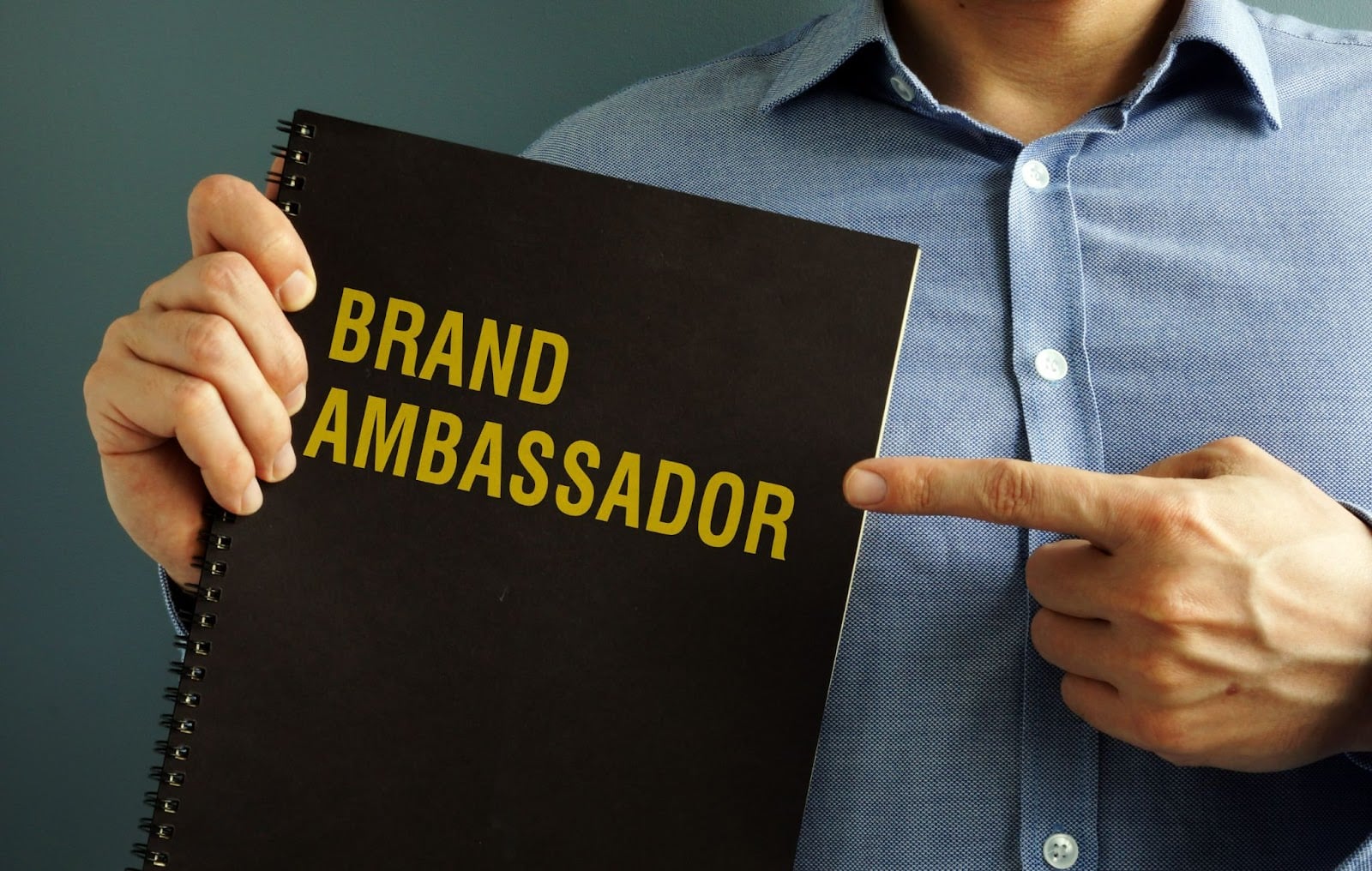Brand Ambassador Meaning

Brand Ambassador—The Meaning Explained
Businesses are often seduced by big numbers in the effort to increase awareness and reach as many people as possible, so they tend to forget that the quality of relationships with their customers matters, too. Marketing tricks come and go, but one approach remains as strong as ever—recommendations from people we know and trust.
The rise of social media and digital marketing introduced more organic approaches to brand promotion, but as the social media fatigue grows, the trust in paid promotion slowly fades and leaves space for marketing strategies that emphasize the value of loyalty and real connection.
More and more businesses put brand ambassador programs at the center of their marketing efforts as the disillusionment with advertising that focuses on influencers grows. This article provides more insight into marketing strategies that rely on the concept of a brand ambassador, the meaning of the term and ways to set up a program that will work for your brand.
What Is a Brand Ambassador?
In broad terms, a brand ambassador can be any individual who promotes a specific brand and its products or services. The end goal of such promotion is to increase brand awareness and sales.
In marketing, this role has usually been played by celebrities or, more recently, social media influencers. Content creators with a significant following on social media or established names in the entertainment industry are popping up everywhere, telling their audiences what to wear, eat, drink, or read.
As marketing strategies evolve and businesses re-evaluate their partnerships with big names, the meaning of the term “brand ambassador” is shifting to put a focus on a more organic word-of-mouth marketing approach. A brand ambassador doesn’t need to have hundreds of thousands or millions of followers on Instagram any longer—any average Joe or Jane who loves your brand and is willing to recommend your products to their social circle can become a valuable addition to your marketing strategy.
While you can reach out to just about anybody who’s been buying your products for years, there are several tried-and-true options when recruiting your future brand ambassadors:
- Customers
- Smaller influencers and content creators
- Your employees or other professionals

Customers
The first group you can focus on is your loyal customers. After all, 92% of consumers around the world trust word-of-mouth recommendations. Customers who keep coming back probably already talk to their friends and acquaintances to promote your business without any compensation—just because they’re happy with your products or services. BrandChamp finds that loyal customers generally refer five of their friends annually to the brand they work with. Those that get recruited into an ambassador program also tend to purchase two or three times more from the brand in question compared to regular customers.
Loyal customers who have stayed with your brand for a long time are most likely to be interested in your brand ambassadorship program, and they are most inclined to make content about your brand for their socials, especially if you offer them additional perks in the form of discounts or freebies.
Smaller Influencers and Content Creators
Influencers and brand ambassadors can easily overlap in what they do, but there is one key factor when considering recruiting influencers as ambassadors for your brand—the size of their following:
| Tier | Number of Followers |
| Mega-influencer | More than 1,000,000 followers |
| Macro-influencer | 500,000–1,000,000 followers |
| Mid-tier influencer | 50,000–500,000 followers |
| Micro-influencer | 10,000–50,000 followers |
| Nano-influencer | Up to 10,000 followers |
While big influencers, mid-tier and above, have a lot of followers and can use their influence to promote a brand and its products or services for specific compensation, they don’t build strong relationships with a huge majority of the people they create content for, and the relationship between your brand and the influencer you choose often lasts just as long as stipulated by an agreement or a contract. An influencer doesn’t even have to be aware of or try your products before you reach out to them to discuss business.
Mega-influencers might look like a better choice for collaboration because of their reach, but research shows that nano- and micro-influencers or established content creators often have better engagement and conversion rates, which makes them much better candidates for brand ambassadors.
Employees or Other Professionals
While customers may have the passion for your brand, your employees often have the passion AND the knowledge about your products or services, making them the perfect material for brand ambassadors who can answer questions and drive conversations.
The public is also more likely to trust the experiences of a regular employee than anything that comes from the company’s marketing department or the leadership. Consumers may be skeptical about what they see on your official social media accounts, but if the message comes from or gets shared by a regular employee, it will have a much bigger impact.
Similarly, many companies reach out to different professionals in their industries and recruit them for their ambassador programs. This is often the case in the fitness industry, where sports nutrition brands work with professional bodybuilders and fitness instructors who spread the word about their products.
What Does a Brand Ambassador Do?
A brand ambassador doesn’t need to create branded dance challenges on TikTok or stand in front of a ring light and a camera talking about your latest makeup line. They can spread your brand’s message just by talking to the people they know.
Regardless of whether they are famous or not, a job description of a brand ambassador generally includes the following:
- Promote the brand’s products or services
- Represent the brand
- Advocate for the values the brand stands for
- Engage with the brand’s audience in a more personal and meaningful way
- Provide feedback on new products and help shape the direction of brand development or the ambassador program itself
While it’s great to have a strong base of loyal and vocal customers ready to recommend your brand at any given moment, most brand ambassadors have transparent formal agreements with companies that set expectations for their promotional activities.
Brand ambassadors are often expected to:
- Create organic promotional content and post regularly on specified social media
- Write blogs about a product or service
- Attend product launches
- Organize and attend product demonstrations
- Communicate with their audiences and collect feedback and recommendations
- Become experts on a given product/service
What Does It Take To Be a Brand Ambassador?
Brand ambassadorship is quite democratic—some brands may set specific requirements for their programs, but many require that you are passionate about their products above everything else.
The best brand ambassadors share several common traits:
- Readiness to learn—Loving a brand and everything it stands for is not enough on its own. A good brand ambassador needs to know the products they are promoting inside and out since they are often the first point of contact for those who are on the verge of becoming customers. For that reason, brand ambassadors need to stay up to date with the latest releases or new features, so that they can relay that knowledge to their audience and make a strong case for the brand in question
- Good knowledge of content production and social media—Platforms like Instagram, Facebook, and TikTok are where most brands connect directly with their customers. While it’s not necessary to have millions of followers to become a brand ambassador, those who wish to pursue this path will benefit from an already established following (no matter how small) and a decent knowledge of what type of content could work best for the brand they’re representing
- Authenticity—Good brand ambassadors genuinely enjoy the brand they’re promoting and have values aligned with the brand’s message. They are actual fans of the products they’re recommending to others and talk about the brand with authentic passion and enthusiasm
- Excellent communication skills—Brand ambassadors know how to connect with their audiences, bring them more value, and build trust and loyalty as mediators between brands and customers

What Do Brand Ambassadors Get for Their Efforts?
While some of your loyal customers won’t expect a single buck for recommending your brand to their social circle, having a full-blown ambassadorship program in place means at least some kind of compensation.
Being a brand ambassador can be a full-time job nowadays, but it is quite rare, and the terms of engagement vary significantly based on the company in question, the ambassador’s qualifications, contract type, time commitment, and other factors.
Few companies decide on paying their ambassadors, especially in the retail industry—giving out different perks and benefits is much more common. When setting up their brand ambassador programs, companies usually choose between these types of compensation:
| Type of Compensation | Details |
| Perks and benefits |
|
| Monetary compensation |
|
The offered compensation and awards depend on the brand’s niche, type of its products or services, company’s goals and resources, etc.

What To Expect From a Brand Ambassador Program
Big paid campaigns and collaborations with influencers who have a big reach, but no genuine relationship with your brand, can only do so much. This type of promotion doesn’t last long and requires money.
Most customers rely on personal recommendations of people they know and trust, and the importance of word-of-mouth marketing has never been greater. The buyers today have learned how to see through the ploys of marketing teams and mega-influencers, so they require a more genuine approach.
Brand ambassadorship programs offer exactly that—a community built organically around its enthusiasm about your brand, which represents your business naturally, without redundant bells and whistles.
The benefits businesses get from relying on brand ambassadors are numerous:
- Ambassadors give your brand a face and a human touch—Consumers prefer dealing with actual, emotionally engaged people rather than faceless logos.
- They expand your social media presence with minimal investment—Building awareness about new product launches, increasing referral sales, or driving traffic to your website is much easier with the help of brand ambassadors who will share your message without expecting much compensation.
- Brand ambassadors increase loyalty and purchase frequency—The key to customer loyalty is honesty, and brand ambassadors who already love and respect your brand promote your business further because they honestly believe in its value.
- They are great for reputation management—Brand ambassadors are excellent additions not only to your marketing team but also to your customer support. If a customer has a question or a complaint on social media, ambassadors can swoop in and react before your team even gets to see the message

Companies That Use Brand Ambassadors Successfully
Many businesses have realized how important brand ambassadors can be for a brand’s reputation and increased sales, especially in industries like:
- Health and wellness
- Lifestyle
- Skincare
- Apparel
- Education
- Tech
Giant brands and small or mid-sized companies alike benefit from brand ambassador programs and constantly strive to scale them up. Here is an overview of some of the best brand ambassador programs.
Lululemon
This athleisure brand uses professional athletes, local yoga instructors, and small influencers as ambassadors. They spread Lululemon’s message online, at local stores, or at community locations and provide feedback on the products. Lululemon’s ambassador program rewards them with increased exposure, mentorship, early access to new releases, free items, discounts, and similar perks.
Sephora
This famous makeup retailer has an ambassadorship program called #SephoraSquad that targets content creators regardless of the number of followers. The application windows are limited to a few months each year, and the program entails a year-long paid partnership with perks like professional coaching, early access to highly anticipated launches, product hauls, and invitations to industry events.
Herbaland
Canada’s largest nutritional gummies manufacturer, Herbaland, saw excellent results from their initial ambassador program and decided to scale it with BrandChamp’s help. They are recruiting loyal customers who have a passion for health and vegan gummies and at least a thousand followers on social media. Their Gummy Crew ambassadors get a free welcome package, shareable discount codes, and invitations to sponsored events while they collect points for completing different promotional activities and redeem them for various other prizes.
How To Find Brand Ambassadors for Your Business
Finding ambassadors for your brand is easier than selecting the right influencer or figuring out the next big marketing campaign—you already have a huge pool of potential candidates in your customers and employees.
Still, before reaching out to your future brand ambassadors, you need to build a well-structured ambassadorship program and come up with an impeccable brand ambassador strategy.
A good program has clearly defined compensation or rewards for the ambassadors that serve as additional motivation to promote your brand. You should think about what makes sense for your niche and your brand.
Brainstorm some activities to kickstart your program and consider writing a guidebook that will help your ambassadors create better content and spread a more uniform message.
After you have everything set, you can start recruiting because the strength of your program will depend on the number of ambassadors. You should do some research on who already raves about your products online and start promoting your ambassadorship program by using these strategies:
- Take advantage of your company’s email list and introduce the program in your newsletter—don’t forget a good call to action and the link to the application.
- Mention your ambassadorship program in after-purchase or shipping confirmation emails sent to customers.
- Write a blog post explaining the details of the program.
- Promote the program on your website using pop-ups, the footer, or the Contact and About Us pages.
- Use the socials—Instagram, YouTube, or pinned posts on Facebook and Twitter.
- Ask your existing ambassadors to promote the program to their followers.
BrandChamp Helps You Scale and Manage Your Brand Ambassador Program
Ambassador programs are game-changers for many brands, especially for those with a strong message and clear values that attract loyal customers and supporters. Still, setting up and running a good ambassadorship program demands time and involves numerous tasks—recruiting ambassadors, tracking their activities, deciding on rewards, approving user-generated content, gathering data, creating reports, and many others. If your program takes off and you decide to scale it, you will just add more work to your plate.
Successful ambassador programs require tribes of enthusiasts who will promote your brand to their social circles, and managing everything can easily become too demanding without proper support.
BrandChamp offers an end-to-end ambassador management software that helps you automate and grow your ambassador program with ease. With two separate dashboards for admins and ambassadors, BrandChamp helps you automate and streamline all day-to-day activities.
Benefits for Both Sides
You don’t have to sacrifice any opportunities to grow your business. By using BrandChamp, your admins can:
- Browse all their ambassadors and easily identify top performers.
- Create all kinds of activities for ambassadors and separate them into groups according to specific goals.
- Track the completion of activities, approve them manually or automatically and collect user-generated content.
- Build unique reward catalogs and issue rewards and commissions without any hiccups.
- Monitor all the relevant metrics and generate reports on the success of campaigns and individual ambassadors.
- Track referral sales and automate rewards to increase purchase frequency, thanks to the easy integration with Amazon, Shopify, and WooCommerce.
At the same time, ambassadors get access to their own branded ambassador portals, where they can:
- Access the brand’s leaderboard and community pages and interact with other brand enthusiasts.
- See their assigned tasks.
- Create and submit their content for approval.
- Collect points for completed tasks.
- Claim their rewards.
BrandChamp facilitates the communication between brands and ambassadors and strengthens the community bonds within your program, leading to increased sales and better brand awareness than ever before.
We have already helped numerous brands create and scale their ambassador programs. EHP Labs was able to go from $6,000 to $30,000 in referral sales thanks to our automation tools, and Passion Planner community managers now successfully engage with more than 900 ambassadors, with BrandChamp helping them improve accountability and prepare for new product launches.

If you want to start reaping the benefits of a well-managed brand ambassador program, contact us and see for yourself how easy it is.







